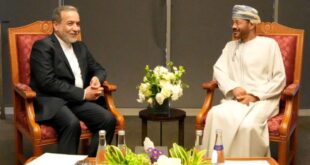 TEHRAN (FNA)- Iranian Foreign Ministry spokesman Hassan Qashqavi said Monday that Western states have no choice but to win Iranians’ trust on the country’s nuclear issue.
TEHRAN (FNA)- Iranian Foreign Ministry spokesman Hassan Qashqavi said Monday that Western states have no choice but to win Iranians’ trust on the country’s nuclear issue.
The West had to give a responsive and “positive” answer to the letter sent by Iran’s top nuclear negotiator Saeed Jalili to the EU foreign policy chief Javier Solana, Qashqavi told reporters at his weekly press conference.
“We hope to continue (nuclear) talks,” the Islamic republic news agency quoted Qashqavi as saying.
Iran has so far had a “massive, constructive and serious cooperation” with the International Atomic Energy Agency (IAEA), he said, adding that Tehran has given a 200-page response to show its goodwill to those “undocumented claims.”
Jalili sent a letter to Solana recently, disclosing Iran’s stance on the West’s behavior towards Iran’s nuclear activities.
The spokesman said the constructive cooperation between Iran, the IAEA and six major powers of Britain, China, France, Germany, Russia and the United States has been emphasized in the letter.
Iranian Parliament Speaker Ali Larijani said Saturday that Iran does not think that nuclear negotiations with the West have reached a standstill and an appropriate solution is still possible if the West would alter some of its behaviors.
The United States and its Western allies accuse Iran of trying to develop nuclear weapons under the cover of a civilian nuclear program, while they have never presented any corroborative document to substantiate their allegations. Iran denies the charges and insists that its nuclear program is for peaceful purposes only.
Tehran stresses that the country has always pursued a civilian path to provide power to the growing number of Iranian population, whose fossil fuel would eventually run dry.
Iran is under three rounds of UN Security Council sanctions for turning down West’s calls to give up its right of uranium enrichment, saying the demand is politically tainted and illogical.
Iran has so far ruled out halting or limiting its nuclear work in exchange for trade and other incentives, saying that renouncing its rights under the NPT would encourage world powers to put further pressure on the country and would not lead to a change in the West’s hardline stance on Tehran.
Iran has also insisted that it would continue enriching uranium because it needs to provide fuel to a 300-megawatt light-water reactor it is building in the southwestern town of Darkhoveyn as well as its first nuclear power plant in the southern port city of Bushehr.
The Islamic Republic says that it considers its nuclear case closed as it has come clean of IAEA’s questions and suspicions about its past nuclear activities.
Observers believe that the US is at loggerheads with Iran over the independent and home-grown nature of Tehran’s nuclear technology, which gives the Islamic Republic the potential to turn into a world power and a role model for other third-world countries. Washington has laid much pressure on Iran to make it give up the most sensitive and advanced part of the technology, which is uranium enrichment, a process used for producing nuclear fuel for power plants.
The US attempt to push for stronger Security Council sanctions was further undermined by the country’s own national intelligence estimate, published in late 2007, which said Iran is not pursuing a weapons program.
Washington’s push for additional UN penalties also contradicts reports by the International Atomic Energy Agency Director General Mohammed ElBaradei – one in November and the other one in February – which praised Iran’s truthfulness about key aspects of its past nuclear activities and announced settlement of outstanding issues with Tehran.
The February report by the UN nuclear watchdog, the International Atomic Energy Agency, praised Iran’s cooperation in clearing up all of the past questions over its nuclear program, vindicating Iran’s nuclear program and leaving no justification for any new UN sanctions.
Also in his latest report to the IAEA’s 35-member Board of Governors, ElBaradei once again verified Iran’s non-diversion of declared nuclear material, adding that the UN agency has failed to discover any “components of a nuclear weapon” or “related nuclear physics studies” in Iran.
The UN nuclear watchdog has also carried out at least 14 surprise inspections of Iran’s nuclear sites so far, but found nothing to support West’s allegations.
The Vienna-based UN nuclear watchdog continues snap inspections of Iranian nuclear sites and has reported that all “declared nuclear material in Iran has been accounted for, and therefore such material is not diverted to prohibited activities.”
Following the said reports, any effort to impose further sanctions on Iran seems to be completely irrational.
Observers believe that Bush’s attempt to rally international pressure against Iran lost steam due to the growing international vigilance.
US President George W. Bush finished a tour of the Middle East in winter to gain the consensus of his Arab allies to unite against Iran.
But hosting officials of the regional nations dismissed Bush’s allegations, describing Tehran as a good friend of their countries.
Many world nations have called the UN Security Council pressure against Iran unjustified, especially in the wake of recent IAEA reports, stressing that Tehran’s case should be normalized and returned to the UN nuclear watchdog due to the Islamic Republic’s increased cooperation with the agency.
 Eurasia Press & News
Eurasia Press & News



